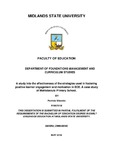Please use this identifier to cite or link to this item:
https://cris.library.msu.ac.zw//handle/11408/3322Full metadata record
| DC Field | Value | Language |
|---|---|---|
| dc.contributor.author | Sibanda, Patricia | - |
| dc.date.accessioned | 2018-11-08T14:18:58Z | - |
| dc.date.available | 2018-11-08T14:18:58Z | - |
| dc.date.issued | 2018 | - |
| dc.identifier.uri | http://hdl.handle.net/11408/3322 | - |
| dc.description.abstract | Motivation is a necessity so that learning becomes a continuing, productive, interesting and enjoyable process. However it has been observed that ECE learners lack motivation and drive towards their school work and as such they suffer academic performance lags. Many reasons can be attributed to this; teachers have therefore tried to come up with measures to ensure that the levels of motivation are improved; however some of these measures have met limited success. This research project therefore sought to investigate the effectiveness of the motivational techniques used by teachers to foster positive engagement in ECE learners at Mahlabezulu Primary School. The challenges presented by students who struggle to connect with curriculum learning in school is not only a Zimbabwean problem but is a contemporary issue that confronts education systems globally and for that reason this researcher drew up the back ground of the study to discuss this state of affairs. The researcher then went on to review literature related to the strategies used in improving learner motivation and fostering learner engagement. The work of other scholars was observed and analysed, the researcher presented a logically structured representation of the concepts, the variables and relationships involved as well as the theories involved in motivation and learner engagement. The researcher focused on Maslow‟s hierarchy of needs as well as Pavlov‟s learning theory and Skinner‟s behaviour modification mode. The author then drew up a procedural plan for the fieldwork and that plan included the use of questionnaires, interviews and participant observations to harvest data. The researcher followed a qualitative research paradigm which utilised the case study method. The data collected from the field showed that the strategies currently being used by the school were moderately effective due to a lack of resources in the school as well as the lack of parental involvement in addressing the issue. Furthermore the issue of hot sitting was a prickly issue as it was identified as the chief contributor to poor motivation among ECE learners. To conclude the study the researcher made vital recommendation some of which included the need to invest in infrastructural development at the school and the need for teachers to give more control to ECE learners in the learning process as well as the need to challenge learners through extension work. | en_US |
| dc.language.iso | en | en_US |
| dc.publisher | Midlands State University | en_US |
| dc.subject | Early childhood learning | en_US |
| dc.subject | Motivation | en_US |
| dc.subject | Academic performance | en_US |
| dc.title | A study into the effectiveness of the strategies used in fostering positive learner engagement and motivation in ECE: a case study of Mahlabezulu Primary School. | en_US |
| item.grantfulltext | open | - |
| item.languageiso639-1 | en | - |
| item.fulltext | With Fulltext | - |
| Appears in Collections: | Bachelor of Education in Early Childhood Education | |
Files in This Item:
| File | Description | Size | Format | |
|---|---|---|---|---|
| Patricia Sibanda R16675B.pdf | Full Text | 1.45 MB | Adobe PDF |  View/Open |
Page view(s)
132
checked on Feb 4, 2026
Download(s)
86
checked on Feb 4, 2026
Google ScholarTM
Check
Items in MSUIR are protected by copyright, with all rights reserved, unless otherwise indicated.



